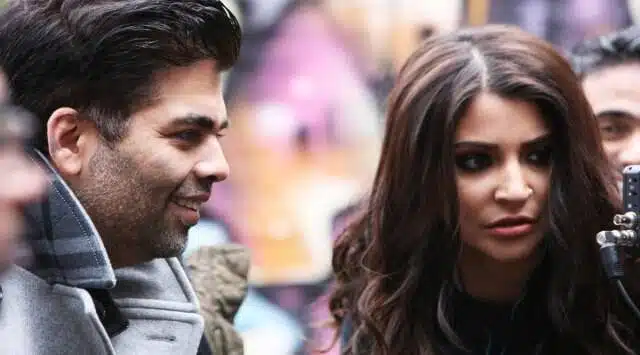
Table of Contents
A video of Bollywood filmmaker Karan Johar has resurfaced on the internet, where he can be heard talking about his attempt to sabotage actor Anushka Sharma’s career. The video is from the 18th MAMI Mumbai Film Festival in 2016, where KJo was promoting his film Ae Dil Hai Mushkil with Anushka and Aishwarya Rai Bachchan. In the video, he admits to wanting to “murder” Anushka’s career before her debut film Rab Ne Bana Di Jodi.
Karan Johar reveals that when Aditya Chopra showed him Anushka’s picture, he immediately dismissed her and suggested another lead actor for the film. However, Anushka impressed Aditya with her audition and eventually landed the role opposite Shah Rukh Khan in the movie. KJo admits that he was reluctant to watch the film but was compelled to do so after seeing Anushka’s performance in Band Baaja Baraat.

The resurfacing of this video has reignited the insider-outsider debate in Bollywood. Apurva Asrani took to Twitter to comment on the video, stating that while Karan Johar remarks were made in jest, they highlight a pertinent issue in the industry. Vivek Agnihotri also expressed similar sentiments on social media, blaming the dirty “backroom politics” of a few individuals for the downfall of talented outsiders in the industry.
This video’s emergence comes just a week after Priyanka Chopra revealed that she felt “cornered” by Bollywood and Kangana Ranaut accused Karan Johar of sabotaging Priyanka’s career because of her friendship with Shah Rukh Khan. These recent revelations and statements have once again brought to the forefront the industry’s nepotism and favoritism issues.
While it is unclear if Karan Johar comments were made in jest or if he was genuinely trying to undermine Anushka’s career, the video’s resurfacing highlights the larger problem of insiders dominating the industry and outsiders struggling to break through. The industry needs to address these issues and provide equal opportunities to all, regardless of their background or connections.
Furthermore, it is essential to acknowledge and celebrate the talents of all actors and filmmakers, whether they are insiders or outsiders. The industry must not limit itself to a select few and create an environment that fosters diversity, inclusivity and creativity.
Conclusion
In conclusion, the resurfacing of this video has once again sparked a discussion on insider-outsider politics in Bollywood. It is crucial for the industry to recognize and address these issues to ensure a fair and equal playing field for all. It is high time that Bollywood moves towards creating an inclusive and diverse environment that nurtures talent and celebrates creativity, regardless of one’s background.













